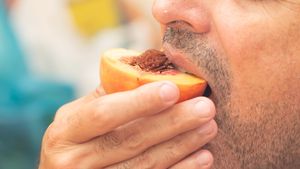An 80-year-old
AIDS activist who Chinese authorities have repeatedly
blocked from going abroad left Monday for the United States
to receive an award from a group supported by U.S.
senator Hillary Rodham Clinton.
Gao Yaojie, a
retired gynecologist, said she was still constrained by
fears of reprisals when she returns home if she spoke too
critically about China's AIDS epidemic while visiting
the United States. ''I feel confused and I am in a
dilemma,'' said Gao at Beijing International Airport
before boarding a flight to Newark, N.J. ''If I don't tell
the truth, I lie to the people in the whole world. If
I tell the truth I am worried that I will be
detained.''
She didn't say
specifically what issues she thought were taboo, but Gao
embarrassed the government by exposing blood-selling schemes
that infected thousands with HIV in the 1990s, mainly
in her home province of Henan. Operators often used
dirty needles, and people selling plasma, the liquid
in blood, were replenished from a pooled blood supply that
was contaminated with HIV.
The Chinese
government and the United Nations say China's problem of
tainted blood had largely been brought under control. Last
year, only about 5% of new reported HIV infections
were blamed on blood selling, which has been banned,
or tainted transfusions, the Health Ministry says.
But the legacy of
the problem, which was initially covered up by the
government, persists. Surviving victims say they have not
been adequately compensated for their suffering and
are unfairly discriminated against. Many children
orphaned by the epidemic lack adequate care, Gao says.
In 2001, Gao was
refused a passport to go to Washington to accept an
award from a U.N. group, and in 2003 she was prevented from
going to the Philippines to receive the Ramon
Magsaysay Award for Public Service. This month, she
was kept under virtual house arrest for about 20 days as
authorities tried to keep her from coming to Beijing to
arrange a visa for the United States.
Gao said local
authorities repeatedly warned her against going abroad and
for weeks dozens of plainclothes police were stationed
outside her apartment to prevent her from leaving.
They relented, informing her February 16 that she was
free to travel.
International
pressure, including separate appeals from Clinton and human
rights groups, helped convince the authorities to let her
go, she said. The decision marked a rare turnaround
for Chinese authorities, who have become increasingly
open about the country's AIDS epidemic in recent years
but remain suspicious of independent activists, whom they
frequently detain and harass.
She was traveling
to the U.S. with a fellow activist and was to attend an
awards ceremony given by Vital Voices Global Partnership on
March 14 in Washington, D.C.
Meanwhile, the
discrimination faced by China's AIDS orphans was the
subject of a short documentary, The Blood of Yingzhou
District, that on Sunday won an Academy Award for
Best Short Documentary. The filmmakers Ruby Yang and
Thomas Lennon told reporters at the awards ceremony in
Los Angeles that the Chinese government has become much more
open and transparent about the AIDS situation over the last
four years but that ignorance about how the disease is
spread remains a serious problem.
Yang told the
Shanghai Daily newspaper earlier this month that
she would apply after the Oscars to have the film
shown on Chinese television. She said she was hopeful
it could help reduce the stigma such children
regularly face. (AP)














































































